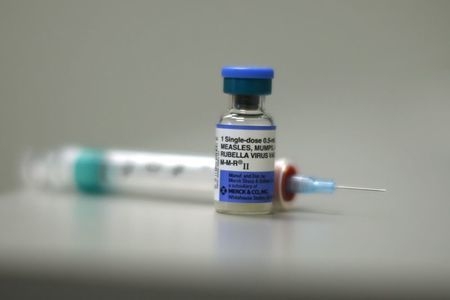Study: Low vaccination rates contributed to Disneyland measles outbreak

The rapid spread of a measles outbreak from Disneyland in California to communities around the country suggests that vaccination rates in some places may be as low as 50 percent, a study suggests.
“Disneyland is an international attraction and sometimes people are coming from places where measles vaccination rates are low or they don’t get the recommended two doses, and that, combined with the fact that there are a lot of pockets of non-vaccination in California and people coming from all over the U.S. created the perfect storm for a big outbreak,” lead author Maimuna Majumder of Boston Children’s Hospital and the Massachusetts Institute of Technology told Reuters Health.
This year, the U.S. is experiencing a multistate measles outbreak believed to have started at Disneyland this past December, as well as three other unrelated outbreaks in Illinois, Nevada and Washington, according to the Centers for Disease Control and Prevention. As of March 6, 173 people from 17 states and the District of Columbia were reported to have measles, with most linked back to Disneyland.
Measles is a highly contagious virus that can be serious or even fatal. It starts with a fever that can last a couple of days, followed by a cough, runny nose, and pink eye. A rash develops on the face and neck then spreads to the rest of the body. In severe cases, pneumonia and encephalitis can develop.
People with measles can be spreading the virus for four days before and after the rash appears, according to the CDC.
The virus can live for up to two hours on surfaces where an infected person coughs or sneezes. People who breathe the contaminated air or touch an infected surface and then touch their eyes, nose or mouth can become infected.
About 96 to 99 percent of people in the community need to be vaccinated against measles to effectively halt its spread. Because about 7 percent of people won’t get immunity from one dose of the vaccine, two doses are recommended in the U.S.
Before the vaccine was developed, each person with measles typically infected 11 to 18 others, Majumder and colleagues write in JAMA Pediatrics.
Based on historical infection rates and the number of individuals infected in the current outbreak, the researchers estimate that vaccination rates in some communities might be as low as 50 percent and probably are no higher than 86 percent.
“Clearly, based on the number of infections we have seen so far, we can say that (the current vaccination rate) is far below the level necessary to achieve herd immunity,” Majumder said.
The timing of the current outbreak, starting during school vacations for many people in the U.S., likely made measles spread more quickly, said Dr. George Rutherford, vice chair of the department of epidemiology and biostatistics at the University of California, San Francisco, in a phone interview.
“There’s nothing magic about Disneyland except that there are a lot of people there,” said Rutherford, who wasn’t involved in the study. “If anything, because it’s outdoors and so spread out, it might be a little harder to transmit.”
Still, mixing tourists from countries where vaccination rates are low, with U.S. kids whose parents don’t vaccinate them for medical or personal reasons, is a likely cause of the current outbreak, he said.
“In this scenario, any one child with measles is going to quickly spread it to just about every other child around them who isn’t already immune,” Rutherford said.
SOURCE: JAMA Pediatrics


















